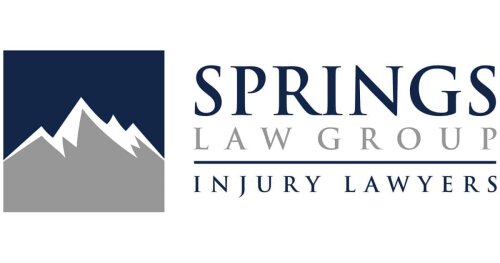Best Appeal Lawyers in Colorado
Share your needs with us, get contacted by law firms.
Free. Takes 2 min.
Or refine your search by selecting a city:
List of the best lawyers in Colorado, United States

About Appeal Law in Colorado, United States
Appeal law in Colorado enables individuals to challenge court decisions they believe were made in error. An appeal is not a retrial or a new trial, but rather a legal process in which a higher court reviews the procedures and decisions in your original case to ensure the law was applied correctly. This process may be initiated in civil, criminal, family, or administrative cases. The appellate courts in Colorado include the Colorado Court of Appeals and the Colorado Supreme Court, each with specific jurisdictions and roles in the state's legal system.
Why You May Need a Lawyer
Appealing a court decision in Colorado can be complex and challenging. Common situations where you may need legal assistance for an appeal include:
- Belief that a mistake was made by the trial court judge regarding the law or court procedure
- Introduction or exclusion of evidence that may have unfairly influenced the trial's outcome
- Receiving an unfavorable verdict in a civil or criminal case
- Shows of bias or misconduct during the trial
- Errors during sentencing in a criminal case or financial awards in civil litigation
- Disagreement with the interpretation of Colorado statutes or regulations
- Issues with jury instructions or the handling of jury deliberations
Local Laws Overview
Appeals in Colorado follow guidelines established by state statutes and rules of procedure. Some key points include:
- Strict time limits apply for filing an appeal - typically 49 days from the date of judgment in most civil cases, and slightly different deadlines for criminal cases
- Appeals generally review only the trial court record - no new evidence can be introduced
- The Colorado Rules of Appellate Procedure outline detailed requirements for notices of appeal, briefs, and oral arguments
- The appellate court's role is to determine if the law was applied properly and whether any legal errors affected the outcome
- Some cases have a right to appeal, while others require permission ("discretionary appeals")
- Most appeals are heard in the Colorado Court of Appeals, though certain cases such as death penalty cases or constitutional questions can go directly to the Colorado Supreme Court
- Possible outcomes include affirming the original decision, reversing it, or remanding it back to the lower court for further proceedings
Frequently Asked Questions
What is an appeal?
An appeal is a legal process in which a higher court reviews the judgment or decision of a lower court to determine if there were legal errors that affected the outcome.
Can I introduce new evidence during my appeal?
No, appeals are based strictly on the record from the original trial. New evidence is not considered in the appeal process.
How long do I have to file an appeal in Colorado?
Time limits vary, but you generally have 49 days from the entry of final judgment in most civil cases. Deadlines are typically shorter in criminal cases.
What are the steps in the appeal process?
The basic steps include filing a notice of appeal, preparing the record on appeal, submitting written briefs, and sometimes making oral arguments before the appellate court.
What are the possible outcomes of an appeal?
The appellate court may affirm the lower court's decision, reverse it, or remand the case back to the lower court for additional proceedings.
Can I appeal any type of case?
Most final judgments can be appealed, but in some cases, you must ask for permission to appeal, especially for certain interlocutory or administrative decisions.
Do I need a lawyer to file an appeal?
You are not required to have a lawyer, but the procedures and legal arguments in appeals are complex. An experienced appellate attorney greatly increases your chances of success.
How long does the appeal process take?
An appeal can take several months to over a year, depending on the complexity of the case and the court's schedule.
What if I miss my appeal deadline?
If you miss the deadline for filing an appeal, you may lose your right to appeal. There are very few exceptions, so timely action is crucial.
What is the difference between the Colorado Court of Appeals and the Colorado Supreme Court?
The Court of Appeals is generally the first level of appellate review for most cases. The Colorado Supreme Court mainly handles cases of significant public importance, questions of law, or cases appealed from the Court of Appeals.
Additional Resources
If you are seeking more information or need assistance with an appeal in Colorado, consider these resources:
- Colorado Judicial Branch - Appellate Courts Division
- Colorado Court of Appeals Clerk's Office
- Colorado Supreme Court Clerk's Office
- Colorado Rules of Appellate Procedure (CRAP)
- Colorado Legal Services - Free and low-cost legal help providers
- Local bar associations for attorney referrals
- Colorado State Public Defender's Office for criminal appeals
- Law school legal clinics in Colorado
Next Steps
If you believe you have grounds for an appeal, take the following steps:
- Act quickly to ensure you meet all deadlines for filing your notice of appeal
- Consult with an attorney experienced in appellate law to discuss the merits of your case
- Gather your case documents, including the trial court opinion, docket, and transcripts
- Review the Colorado Rules of Appellate Procedure to understand filing requirements
- Contact local legal aid services or bar associations if you need help finding a lawyer
- Prepare to work closely with your attorney to develop strong legal arguments for your appellate brief
Lawzana helps you find the best lawyers and law firms in Colorado through a curated and pre-screened list of qualified legal professionals. Our platform offers rankings and detailed profiles of attorneys and law firms, allowing you to compare based on practice areas, including Appeal, experience, and client feedback.
Each profile includes a description of the firm's areas of practice, client reviews, team members and partners, year of establishment, spoken languages, office locations, contact information, social media presence, and any published articles or resources. Most firms on our platform speak English and are experienced in both local and international legal matters.
Get a quote from top-rated law firms in Colorado, United States — quickly, securely, and without unnecessary hassle.
Disclaimer:
The information provided on this page is for general informational purposes only and does not constitute legal advice. While we strive to ensure the accuracy and relevance of the content, legal information may change over time, and interpretations of the law can vary. You should always consult with a qualified legal professional for advice specific to your situation.
We disclaim all liability for actions taken or not taken based on the content of this page. If you believe any information is incorrect or outdated, please contact us, and we will review and update it where appropriate.
Browse appeal law firms by city in Colorado
Refine your search by selecting a city.










